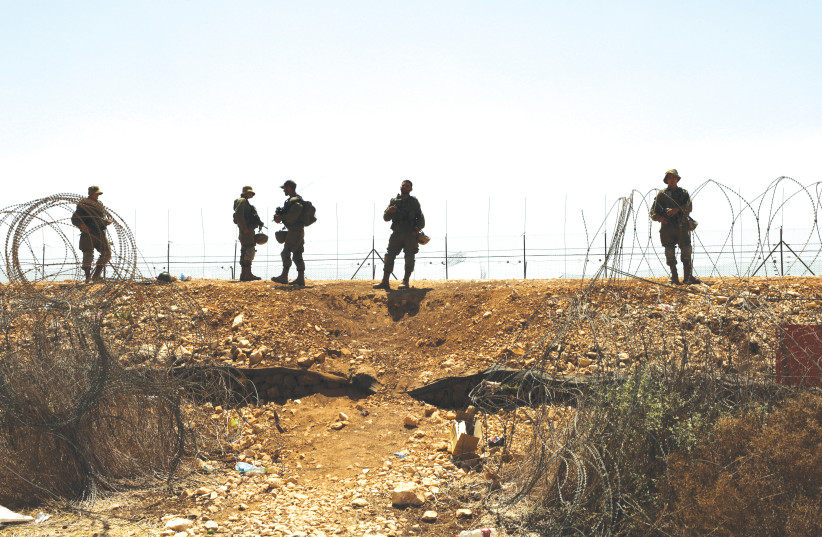Sometimes, policy, efficiency and law conflict.
The IDF’s new open-fire regulations allowing troops to use live fire against those trying to steal guns and other weapons from military bases will probably help reduce some of the wave of murders of Israeli Arabs.
The logic is that if there are fewer illegal guns going around – many of which were stolen from isolated and poorly defended IDF bases – there will be fewer murders.
Moreover, it seems insane and infuriating that there would be a continuing problem that common criminal Israeli-Arab or Israeli-Bedouin gangs are able to supply their weapon needs by stealing from the region’s greatest military power.
So it is hard to argue against the new rules from a policy-results or efficiency perspective.

If the narrative is that soldiers being overly worried that they would injure the thieves is what was allowing them to rob IDF bases of weapons, then being a little more aggressive in protecting such deadly weapons from criminals sounds obvious.
However, the devil is in the details – and in this case, in the law.
There are many areas of multiple competing views by which Israel can feel free to take more aggressive interpretations, because it is dealing with large terrorist groups like Hezbollah and Hamas that would wipe out the Jewish state if they could.
This is not one of those scenarios.
This is not some kind of concerted attack by Hezbollah or Hamas on an IDF base, which would obviously be considered a serious military threat and no questions would be asked.
The question rather is what use of force is legal against one or two bandits who may not even be armed, who cut through an IDF fence to a military base, and sneak past guards to steal guns from a storage area in order to then flee and make money.
If unarmed, the bandits present no imminent threat.
In fact, such bandits do not even use the guns themselves – their plan is mainly to sell to others to make money.
Is it legal to shoot-to-kill thieves?
In most democracies in 2021, the answer is an unequivocal “No.”
There were more democracies that previously had rules allowing homeowners to shoot to kill thieves even if it might seem like they were fleeing, based on the idea that anyone robbing a home was someone aggressive enough to be prepared to murder the homeowner; and older notions of “a man’s house is his castle.”
Few democratic legal systems in 2021 support shooting fleeing thieves in such circumstances.
Is a military base different?
Can the IDF argue that someone who is brazen enough to steal from a military base – and whose goal is to steal deadly weapons at that – is in a different category of posing some broader danger to society, even if they present no imminent danger to the soldiers confronting them?
There could be some policy arguments that it does not matter if the thieves intend to kill anyone, and that their intention to sell deadly weapons to others who are likely to kill is enough to permit using deadly force against them.
In the US, only “less than deadly force” is allowed “to prevent the destruction of Department of Defense property” or to arrest someone, such as a thief.
“Deadly force” can be used to prevent the theft or sabotage of assets “vital to national security,” or relating to “national critical infrastructure.”
Presumably, this would include shooting to kill a thief trying to break into a nuclear facility, but not at a thief who is fleeing with guns and ammunition.
All of this means that the IDF may be opening up a new front for the International Criminal Court and global media critics, when the next thief is shot and killed dozens of meters off base as he is running away.
No one knows how the ICC will decide to deal with Israel, but Jerusalem might want to be careful about giving The Hague new excuses for future conflict.
The other problem is that it is not clear shooting-to-kill will solve the problem.
Many of the thefts have been found to be at least partially inside-jobs, or from bases where there are practically no guards, or where the defenses and guards in place have close to zero effectiveness.
Giant bases with a few guards at the front gate merely require resourceful thieves to figure out which parts of the base are not being watched.
So one scenario has Israel running into new scandals of fleeing thieves shot dead, while at the same time guns and weapons continue to be stolen from poorly defended bases or where the theft is an inside job.
Another approach would be to take protecting internal bases seriously, as opposed to just the borders, and to put in place a better system for cross-checking where weapons end up, so that one or two bad-apple officers cannot maintain their own black-market deals without getting caught.
Time will tell whether the new policy reduces illegal shootings or creates more headaches than it fixes.
